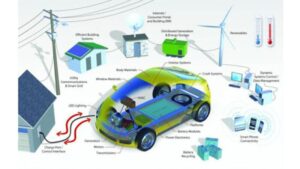Downstream preparation and local ancillary needed for Malaysia’s expanding automotive and electronic vehicle ecosystem
Amid significant injections into the Malaysian Automotive market, the helping hand of collaborative robots can help sub-sector players deal with newly accelerated peaks in manufacturing
By Marvin Ming, Country Manager Malaysia, Universal Robots
Malaysia has taken a major leap forward in its quest in becoming the region’s automotive and EV hub, with industry leaders Tesla choosing the nation to be its regional headquarters. This deal comes amid an injection of Electric Vehicle (EV) related investments stemming from 2018, with the Malaysian Investment Development Authority (MIDA) approving 58 EV investment projects totaling RM 26.2 billion.
Currently, the country has nearly 1,000 EV charging stations and plans to build a further 10,000 across the country by 2025, with this investment aimed at covering vehicle assembly along with the manufacturing of EV parts and charging components.
Malaysia does seem to be shaping into the region’s automotive hub and EV hub, but is the nation ready for the increased demands this entails? It is paramount that sub-sector players in Malaysia have to make downstream preparation for the strain on the industry this impending transformation is going to bring about.
Becoming the Region’s Automotive Hub
According to reports, the Asia-Pacific EV market was valued at US$230 billion in 2021 and is expected to reach US$778 billion come 2027. The recent Tesla announcement is not the only factor in the sector’s increased value, as three major Chinese automotive players – BYD, Great Wall Motor, and Cherry, have also launched in Malaysia this year. Additionally, Malaysia is also home to other international automotive companies and assembly plants, with the likes of Porsche, BMW, and Mercedes-Benz all manufacturing within the country.
Equipped with the existing expertise in manufacturing, Malaysia’s components sub sector could potentially be used to double up in servicing the projected automotive exploits, covering a vast array of semiconductors, sensors, automotive electronics, transceivers, batteries, and vehicle assembly. Players in the field have the blueprint for transforming Malaysia into an automotive hub to be reckoned with within the region.
Despite this, the ambitions in making the country the region’s automotive hub will still expose issues within its manufacturing industry due to increased demand and stalling efficiency.
Automation and Alleviating Manufacturing Issues Caused by Increased Demand
The implementation of automation on manufacturing floors throughout the nation can aid in solving various issues faced in the increased manufacturing of automotives. As some of the assembly process requires the introduction of specific automation technologies to ensure product standards, collaborative robots (cobots) offer the solution for manufacturers.
Production criteria includes quality and repeatability, ergonomics, operating precision, as well as quality. Collaborative applications help address these operational issues, improving the series of production tasks previously performed manually. Cobots can help guarantee the quality requirements as well as free operators from repetitive and physically demanding manual tasks. The marvel of man-machine collaboration is that it allows workers to be stationed at processes that are of greater value and require the human touch.
As an example outside of Malaysia, the iconic Fiat 500 has also jumped onto the EV bandwagon, with the Italian brand now offering an electric variant of the car. This shift meant that the car’s production line required the introduction of said specific automation technologies to meet product standards. This, along with the staff’s high average age, prompted them to adopt 11 cobots from Universal Robots at the factory to aid with production.
The cobots helped with tasks which include the application of waterproof liner to vehicle doors, checking on soft-top dimensions, hood mounting, and tightening of rear-side door hinges, among others. The collaborative applications adopted by the factory have delivered significant benefits in terms of operating precision and quality, and improved the ergonomics of a series of operations previously performed manually.
In the changing landscape of automotive and EV in Malaysia, demands are bound to skyrocket which in turn puts added pressure on workers at manufacturing plants. The adoption of cobots not only helps with coping with these demands, but also improves the quality of life for workers down on the manufacturing floor – ensuring a smooth-running system that will aid ushering in the era of Malaysia becoming the hub of the region.
Keeping Up with Automation and Ensuring Growth in Manufacturing
As Malaysia grows into becoming the region’s automotive hub, automation will be key to growth within the industry. With the automotive manufacturing industry being one of the country’s strengths, it is important to strengthen the grip instead of being complacent and falling behind others who might want a slice of the pie.
Malaysia’s robot density in the manufacturing sector was behind the global average in 2019, and has been lagging behind regional counterparts such as Singapore. For comparison, Thailand gained 37% in their population of robotics in 2021, and the continued upward trajectory will further improve multiple sectors, most importantly in the automotive manufacturing one – spelling a threat to Malaysia’s automotive manufacturing bid.
Overall, the adoption of automation will help with productiveness, and profitability due to its effectiveness and efficiency. It will further improve the industry and make it more appealing for investors, which in turn will ensure further growth for the sector. In becoming the automotive and EV hub of the region, Malaysia can look towards automation as the tool to cope with demands and cement themselves as industry leaders.



